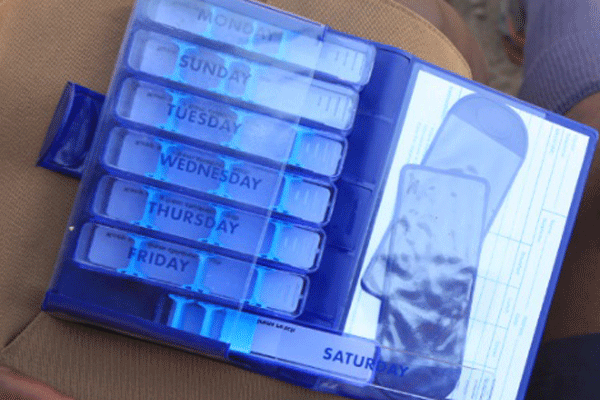
Gracious is an 18-year-old girl who was diagnosed with HIV at the age of 13. However, her family was afraid to tell her about her HIV status and instead told her that she had a heart condition. Gracious told her friends at school that she was on medication for her heart condition. However, the friends suspected that she was HIV-positive because she was often sick. Gracious took her medication to school in order to prove her friends wrong. However, her teacher saw the ARV medication and informed Gracious that it was for people living with HIV. This experience devastated Gracious, who stopped adhering to her ARVs.
By Tinashe Rufurwadzo

In February 2016, the head of guidance and counselling at Gracious’ school attended a Dreams initiative training on comprehensive sexuality, HIV and Aids education, presented by SafAids, Africaid and the National Aids Council (NAC). Following the training, the teacher referred Gracious to the Zvandiri programme for counselling and support, linked to other services for young people living with HIV. Gracious began attending the local Zvandiri support group and learned that she was not alone in her experiences. She became a regular member of the support group, where she acquired information and skills from her peers on growing up with HIV, including the importance of treatment adherence. She received a pill box to manage and monitor her medication and improve her health.
Gracious’ local clinic nominated her for a Community Adolescent Treatment Supporter (Cats) training. Following the training, led by Africaid and the Ministry of Health and Child Care, Gracious connected with young people in her community to provide counselling, support and follow up so that they could also be helped to adhere to their ARVs. Gracious is mentored by the Zvandiri mentor (Africaid district focal person) during Cats coordination meetings. She also gets daily supervision from the nurse at her designated health facility, who also attended Africaid and Health ministry training programmes to provide child and adolescent HIV-testing services for children, adolescents, and young people.
“I benefitted from being a Cats because I had been defaulting a lot on my medication. After the training, I am now taking my medications well,” said Gracious.
With financial assistance from the Family Aids Counselling Trust to pay her school fees, Gracious repeated the two subjects she failed the previous year. The school’s head of guidance and counselling also invited Gracious to help plan and implement a school-wide anti-stigma campaign. Following this campaign, two students shared the challenges they faced as adolescents living with HIV as they struggled with adherence and their deteriorating health. Gracious connected with each of them to support their treatment adherence and contribute to their improved health. Gracious also identified a student facing severe food shortages at home and worked together with the school to plan a fundraising day to provide her with assistance.
“Besides me, there are also other children that are benefitting from me. I helped a girl who was being discriminated at our school and the training from Africaid has helped me to help her. I also give thanks to Africaid for helping us,” said Gracious.
In November 2016, Gracious completed her O’ Level and she can now pursue further studies and she hopes to study law, with the long-term goal of offering free legal assistance to organisations that implement programmes for orphans and vulnerable children, including adolescents and young people living with HIV.
- Chamisa under fire over US$120K donation
- Mavhunga puts DeMbare into Chibuku quarterfinals
- Pension funds bet on Cabora Bassa oilfields
- Councils defy govt fire tender directive
Keep Reading
Through the Dreams and Game Changer programme — which strives to nationalise the Zvandiri Model with a primary focus on upscaling the Cats programme in 25 of Pepfar’s 36 priority districts. The Game Changer has the aim of increasing the availability and quality of care and treatment services for persons living with HIV and Aids, with a specific focus on scaling up differentiated care models for children, adolescents and young people. Africaid seeks to improve outcomes for children and adolescents throughout the HIV care cascade by improving the uptake of HIV-testing services, linkages, adherence, and retention in care.
Gracious’ story illustrates how the Dreams programme, with funding from USAid through Management Sciences for Health, offers multiple services for adolescent girls and young women. Trained, supported teachers initially identified and referred Gracious to Zvandiri for peer-led community treatment support. Together with trained, mentored health care workers, Zvandiri Cats supported her to adhere to her medication, resulting in her being Aids-free. She received psychosocial support, assisting her to become resilient. Educational assistance transformed the likelihood of Gracious being able to pursue further education. She is now determined to become a lawyer. Now as a trained, mentored Cats, Gracious has been empowered to support her HIV-positive peers so that they, too, are determined, resilient, empowered, Aids-free, mentored and safe (Dreams).
In the first year of the Dreams initiative in Makoni district, 7 440 individuals between the ages of 15 and 24 received HIV-testing and counselling services and learnt their test results, with 310 individuals testing positive for HIV. In the first quarter this year, under the Game Changer programme, 273 children, adolescents and young people were on ART and 274 were receiving community-based care through the Cats programme.
Government, through the Ministry of Health and Child Care working together with NAC and other ministries, such as Public Service and Social Welfare, Primary and Secondary Education as well as Women’s Affairs, Gender and Community Development, are working together to ensure that adolescent girls and young women and young men as well, are protected from HIV infection.











